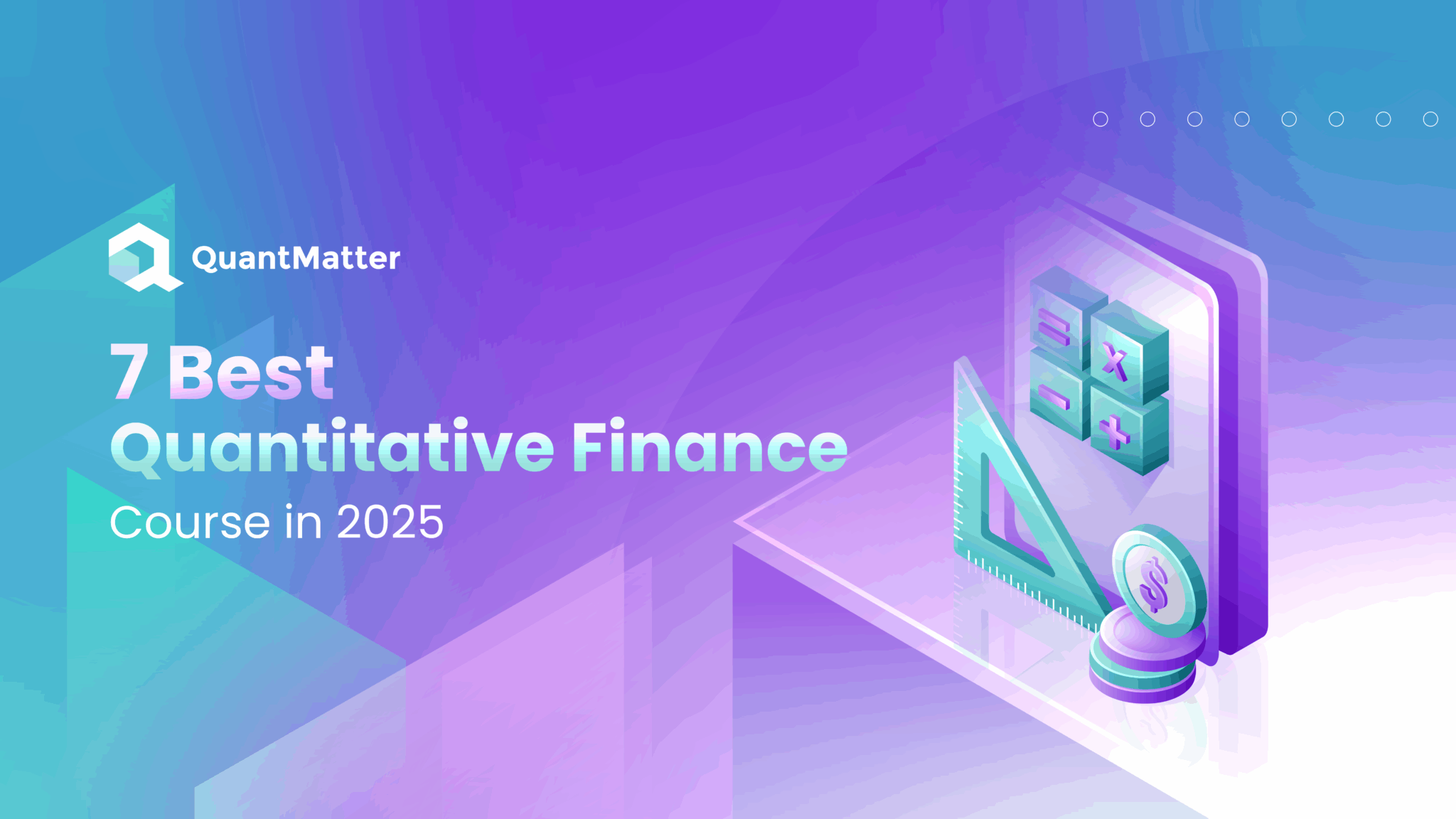
In the dynamic realm of finance, quantitative analysis has emerged as a cornerstone for decision-making, risk assessment, and strategic planning. As financial markets become increasingly complex, the demand for professionals adept in quantitative finance has surged. This field, which marries mathematics, statistics, and computer science with financial theory, offers tools and models that are indispensable in today’s data-driven financial landscape.
For individuals aiming to carve a niche in this domain, selecting the right educational pathway is crucial. With a plethora of courses and certifications available, understanding the landscape of quantitative finance education can be daunting. This article delves into the essence of quantitative finance, explores top-tier courses and certifications, and provides insights to guide aspiring quants on their educational journey.
What is Quantitative Finance?
Quantitative finance, often referred to as “quant finance,” is a discipline that applies mathematical models, statistical techniques, and computational tools to analyze financial markets and securities. It encompasses areas such as risk management, derivative pricing, algorithmic trading, and portfolio optimization. Professionals in this field, known as quants, leverage these tools to make informed decisions, predict market movements, and develop trading strategies.
The evolution of quantitative finance has been propelled by advancements in technology and the increasing availability of financial data. Today, quants play pivotal roles in hedge funds, investment banks, asset management firms, and fintech companies, driving innovation and efficiency in financial operations.
Core Components of Quantitative Finance Education

A comprehensive quantitative finance education is more than an accumulation of technical skills—it’s a multidimensional journey that bridges theory with practical application. In a field where precision, adaptability, and innovation are paramount, the curriculum must foster deep analytical thinking and cross-disciplinary expertise. From mastering mathematical foundations to applying cutting-edge machine learning techniques, these core components form the bedrock of any successful career in quantitative finance.
- Mathematics and Statistics: Fundamental concepts such as calculus, linear algebra, probability, and statistical inference form the backbone of quantitative analysis. These tools enable professionals to construct models, interpret data trends, and simulate financial scenarios with accuracy.
- Financial Theory: Understanding financial instruments, markets, and theories like the Efficient Market Hypothesis and Capital Asset Pricing Model is essential. These principles guide model assumptions, valuation strategies, and investment decision frameworks.
- Computational Skills: Proficiency in programming languages (e.g., Python, R, C++) and tools for data analysis and modeling is crucial. These capabilities empower quants to create and refine algorithms, manipulate large datasets, and develop automated trading systems.
- Risk Management: Techniques for identifying, assessing, and mitigating financial risks are integral to the discipline. A strong grasp of risk models helps professionals protect portfolios against market volatility and systemic disruptions.
- Machine Learning and AI: Modern quantitative finance increasingly incorporates machine learning algorithms for predictive analytics and automated trading. These tools are invaluable for pattern recognition, portfolio optimization, and crafting adaptive trading strategies.
Each of these components contributes to the development of a comprehensive skill set that enables professionals to not only interpret but also shape the dynamics of financial markets. As the landscape becomes more data-intensive and technology-driven, possessing expertise in these core areas is indispensable for anyone looking to lead in the world of quantitative finance.
Also Read: 10 Best Crypto Fund Management in Dubai – Updated List for 2025
7 Best Quantitative Finance Course in 2025

Here are some of the leading programs making waves in quantitative finance education for 2025:
- Certificate in Quantitative Finance (CQF) – Best for working professionals seeking advanced practical skills
- MITx: Mathematical Methods for Quantitative Finance – Best for rigorous mathematical foundation
- Finance & Quantitative Modeling for Analysts (University of Pennsylvania) – Best for applied financial modeling
- Oxford Algorithmic Trading Programme – Best for algorithmic trading and AI strategies
- WorldQuant University MSc in Financial Engineering – Best for affordability and accessibility
- Financial Engineering and Risk Management (Columbia University) – Best for structured risk analysis training
- Financial Derivatives: A Quantitative Finance View (Udemy) – Best for hands-on Python-based derivatives training
Looking to launch or elevate your career in quantitative finance in 2025? Here’s a closer look at the 7 best courses and certifications shaping the future of this fast-paced, high-impact field. Whether your goals lie in algorithmic trading, financial engineering, or risk modeling, these programs offer the academic rigor, technical depth, and flexibility you need to thrive in an increasingly data-driven financial world.
1. Certificate in Quantitative Finance (CQF)
Offered by the CQF Institute, the Certificate in Quantitative Finance is one of the most recognized professional credentials in the industry. Tailored for finance professionals and career switchers, this part-time, intensive online program offers deep training in quantitative modeling, derivatives, risk management, and machine learning. The curriculum is designed with real-world application in mind, preparing students for the practical demands of roles in investment banking, hedge funds, and fintech. With rolling admissions and flexible pacing, it allows learners to upskill without taking a career break.
2. MITx: Mathematical Methods for Quantitative Finance
This course, part of MIT’s renowned MicroMasters Program in Finance on edX, provides a rigorous academic framework ideal for those aiming to pursue graduate-level study or research roles. Students delve into key quantitative topics including linear algebra, stochastic processes, and probability theory, all within the context of financial applications. Designed by top-tier MIT faculty, this course builds a mathematical toolkit that’s indispensable for modeling uncertainty and risk in financial systems. It also serves as an excellent stepping stone for those aiming to enroll in an MSc or PhD in finance or economics.
3. Finance & Quantitative Modeling for Analysts (University of Pennsylvania)
Hosted on Coursera and developed by Wharton, this program is tailored for aspiring analysts and finance professionals who need a hands-on understanding of financial modeling. Spread across several modules, it covers essentials such as discounted cash flow (DCF) analysis, Monte Carlo simulations, portfolio optimization, and risk metrics. This specialization not only teaches technical skills but also focuses on applying them to real-world investment decisions and corporate finance challenges. It’s particularly valuable for those in equity research, investment analysis, or corporate finance roles.
4. Oxford Algorithmic Trading Programme
This elite program from the University of Oxford is perfect for finance professionals looking to harness algorithmic and data-driven trading techniques. Delivered entirely online, it offers a structured overview of market microstructure, trade execution, quantitative signal generation, and machine learning applications in trading. Participants benefit from the prestige and rigor of Oxford’s academic environment while engaging in peer learning and mentorship. This course is especially suited for traders, data scientists, and technologists seeking to understand or build algorithmic trading systems.
5. WorldQuant University MSc in Financial Engineering
WorldQuant University offers a unique opportunity: a tuition-free, fully accredited Master’s program that is globally accessible. With a focus on democratizing elite financial education, the MSc in Financial Engineering equips students with advanced quantitative modeling skills, programming capabilities, and financial theory. The curriculum includes courses on time-series analysis, machine learning, computational methods, and portfolio theory. It’s perfect for global learners and career changers looking to gain an edge without the burden of tuition, while participating in a diverse international learning community.
6. Financial Engineering and Risk Management (Columbia University)
This Coursera specialization from Columbia University targets professionals interested in derivative pricing, stochastic processes, and comprehensive risk modeling. The course covers both theoretical foundations and their real-world application in corporate finance, banking, and asset management. Taught by experienced Columbia faculty, it incorporates interactive projects and problem-solving exercises that simulate the types of tasks encountered in quantitative roles. It’s particularly well-suited for mid-career professionals looking to deepen their understanding of financial risk and instruments.
7. Financial Derivatives: A Quantitative Finance View (Udemy)
Designed for practical learners and coding enthusiasts, this self-paced course on Udemy bridges the gap between financial theory and Python-based implementation. It breaks down complex topics like forwards, futures, options, and swaps using intuitive explanations and live coding examples. Students not only gain an understanding of pricing mechanisms and risk metrics but also build scripts to value and analyze financial instruments. Ideal for entry-level professionals or tech-savvy individuals wanting to quickly gain quant skills with immediate practical value in fintech, banking, or investment roles.
These standout programs offer something for every aspiring quant—from self-paced online tutorials to rigorous master’s programs. In a world where financial markets are shaped by algorithms and data, the right training can be your gateway to a high-impact, future-ready career in quantitative finance.
Comparison of Top Quantitative Finance Programs

Selecting the right quantitative finance program is a pivotal step toward building a successful career in financial analysis, trading, or risk management. Given the vast number of available courses, it’s crucial to understand how each program differs in structure, focus, and prerequisites. This comprehensive comparison provides a snapshot of the leading educational offerings in the field, enabling prospective students to make an informed decision based on their goals, experience, and preferred learning formats.
| Program | Provider | Format | Duration | Focus Areas | Prerequisites |
| Certificate in Quantitative Finance (CQF) | CQF Institute | Online | 6 months | Derivatives, Risk Management, ML | Math, Programming |
| Mathematical Methods for Quantitative Finance | MITx (edX) | Online | 12 weeks | Mathematics, Stochastic Processes | Calculus, Linear Algebra |
| Finance & Quantitative Modeling for Analysts | University of Pennsylvania (Coursera) | Online | 4 months | Financial Modeling, Risk Analysis | Basic Finance Knowledge |
| Oxford Algorithmic Trading Programme | University of Oxford | Online | 6 weeks | Algorithmic Trading, Machine Learning | Finance, Programming |
| MSc in Financial Engineering | WorldQuant University | Online | 2 years | Financial Engineering, Computational Tools | Bachelor’s Degree |
| Financial Engineering and Risk Management | Columbia University (Coursera) | Online | 4 months | Risk Management, Derivative Pricing | Math, Programming |
| Financial Derivatives: A Quantitative Finance View | Udemy | Online | Self-paced | Derivatives, Python Tools, Fixed Income Analysis | Open to all levels |
This comparison illustrates the breadth of options available to aspiring quants—from short-term professional certificates to full-fledged master’s programs. By reviewing the focus areas, learning formats, and required backgrounds, individuals can better determine which program aligns with their current capabilities and long-term career ambitions. Whether you’re just starting out or seeking to enhance existing skills, these top-tier programs offer valuable pathways into the ever-evolving world of quantitative finance.
Also Read: Top 12 Algo Trading Books to Consider in 2025
Selecting the Right Program
With a wealth of quantitative finance programs available today, selecting the one that best fits your personal and professional goals requires thoughtful analysis. The right program can be a transformative investment, equipping you with the skills and credentials needed to enter or advance within this highly competitive field. Whether you’re transitioning from a different discipline or deepening your current expertise, understanding what each program offers—and what you need from it—is essential to making a smart choice.
When evaluating your options, consider the following factors:
- Career Objectives: Identify whether your interest lies in academia, industry, or research, and select a program that aligns with these goals. For example, academic roles may require a stronger theoretical foundation, while industry-focused roles may favor hands-on modeling and programming.
- Background and Experience: Consider your current proficiency in mathematics, programming, and finance to ensure you meet the program prerequisites. Some courses are designed for beginners, while others assume a working knowledge of advanced quantitative techniques.
- Learning Format: Decide between online or in-person learning based on your schedule, learning style, and geographical constraints. Online programs offer flexibility and accessibility, while in-person options may provide deeper engagement and networking opportunities.
- Cost and Accessibility: Evaluate the financial investment required and explore options like scholarships, free programs, or employer-sponsored education. Consider the return on investment not just in terms of salary potential, but also in career trajectory and long-term fulfillment.
By thoroughly assessing these factors, you’ll be better positioned to choose a program that not only aligns with your current situation but also supports your aspirations. The ideal course will serve as more than just an academic endeavor—it will be a strategic launchpad for building influence, resilience, and expertise in the evolving world of quantitative finance.
Conclusion
Quantitative finance stands at the forefront of modern financial analysis, offering tools and methodologies that are indispensable in today’s data-centric world. Pursuing education in this field equips individuals with the analytical prowess to navigate and influence complex financial systems.
As the financial landscape continues to evolve, so too does the need for skilled quants. By selecting the right course or certification, aspiring professionals can position themselves at the nexus of finance and technology, driving innovation and strategic decision-making in the industry.
Disclaimer: The information provided by Quant Matter in this article is intended for general informational purposes and does not reflect the company’s opinion. It is not intended as investment advice or a recommendation. Readers are strongly advised to conduct their own thorough research and consult with a qualified financial advisor before making any financial decisions.

I'm Carina, a passionate crypto trader, analyst, and enthusiast. With years of experience in the thrilling world of cryptocurrency, I have dedicated my time to understanding the complexities and trends of this ever-evolving industry.
Through my expertise, I strive to empower individuals with the knowledge and tools they need to navigate the exciting realm of digital assets. Whether you're a seasoned investor or a curious beginner, I'm here to share valuable insights, practical tips, and comprehensive analyses to help you make informed decisions in the crypto space.
- Carinahttps://quantmatter.com/author/carina/
- Carinahttps://quantmatter.com/author/carina/
- Carinahttps://quantmatter.com/author/carina/
- Carinahttps://quantmatter.com/author/carina/
